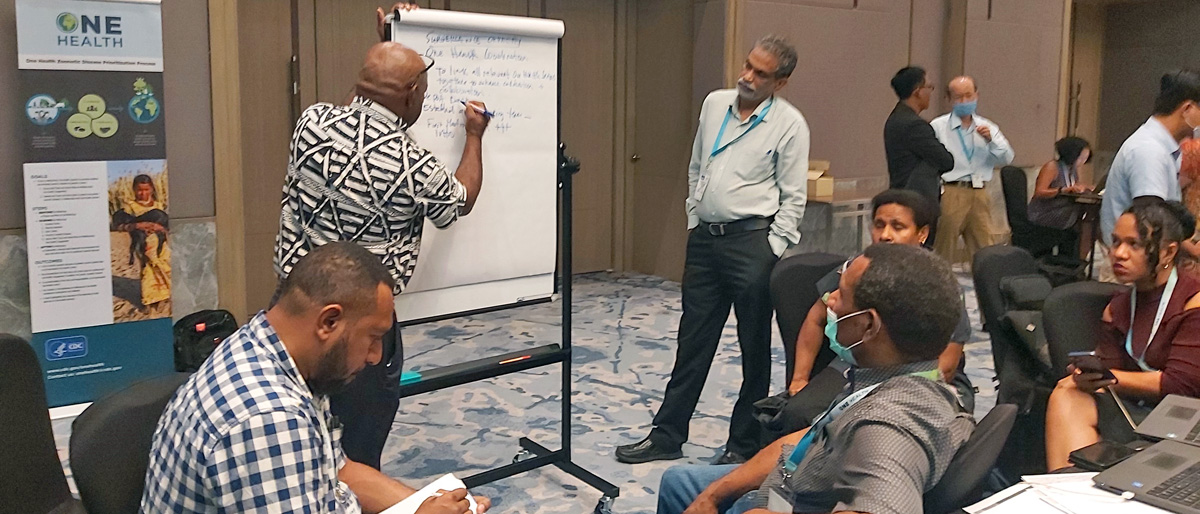Defining and prioritizing the greatest health risks are crucial for better utilization of available resources and capacities, advancing technology and research, and developing strategies and actions for better prevention, preparedness, detection and response measures. As an integrated One Health approach is essential for progress to combating health threats, priorities across relevant sectors should be harmonized in order to sustainably balance and optimize the health of people, animals and ecosystems.
The One Health Zoonotic Disease Prioritization (OHZDP) process, developed by the United States Centers for Disease Control and Prevention (US CDC) with assistance from FAO in facilitating the tool, uses a comprehensive, multisectoral approach to identify and prioritize zoonotic diseases of greatest concern. By fostering collaboration among One Health partners, OHZDP not only determines priority diseases but also develop next steps and action plans to address them(1).
Advantages of OHZDP
The OHZDP process brings together representatives from human, animal, and environmental health sectors, as well as other relevant partners, to prioritize zoonotic diseases of greatest concern for multisectoral, One Health collaboration in a country, region, or other area. This process uses a transparent approach and incorporates equal input from all represented One Health sectors working at the human-animal-environment interface. Over 40 countries and regions have utilized OHZDP process and the reports can be accessed here.
Our roles
In June 2019, FAO and US CDC One Health Office and FAO co-organized a master facilitator training workshop on OHZDP in Rome, Italy. FAO ECTAD participated the training alongside experts from multiple regions. The training was designed to assist national and regional efforts in zoonotic disease prioritization.
Since then, FAO has been co-facilitating One Health and animal disease prioritization in the Asia-Pacific region, together with US CDC One Health Office.
Prioritization of Animal Diseases
The OHZDP process can be adapted to prioritize animal diseases and was utilized in ASEAN to prioritize transboundary animal diseases. As per the recommendations from the ASEAN Sectoral Working Group on Livestock in 2019, a training of trainers on the OHZDP process for representatives from ASEAN Veterinary Epidemiology Group (AVEG) was conducted in Malaysia in July 2019. Seventeen facilitators were trained, including seven from ASEAN Member States.
In October 2019, US CDC and FAO provided refresher training, trained six facilitators from Cambodia, Lao People’s Democratic Republic, Malaysia, Myanmar, the Philippines and Singapore. The Transboundary Animal Disease Prioritization Workshop for ASEAN was held in October 2019 in Indonesia, with 23 representatives from nine ASEAN countries and two from the ASEAN Secretariat. The workshop resulted in prioritizing nine transboundary terrestrial domestic animal diseases for ASEAN, with discussions on regional gaps and solutions for each priority disease.
Regional facilitator training for Southeast Asia
In 2023, FAO participated as a facilitator in US CDC’s training on OHZDP methodologies to 88 government representatives from human, animal and environmental health ministries across seven Member Nations in Southeast Asia and Papua New Guinea. Participants from Quadripartite regional and country offices, US CDC country offices and ASEAN Centre for Biodiversity, and FAO and WHO country offices in Indonesia, Lao People’s Democratic Republic, Philippines and Viet Nam also took part in this regional training.

Regional facilitator training for Southeast Asia. ©FAO/Yin Myo Aye
Animal disease prioritization in the region
- ASEAN Veterinary Epidemiology Group (AVEG)
OHZDP in the region
- AVEG (2019)
- Indonesia (2021)
- Thailand (2022)
- Singapore (2023)
- Cambodia (2023)
- Bhutan (2024)
